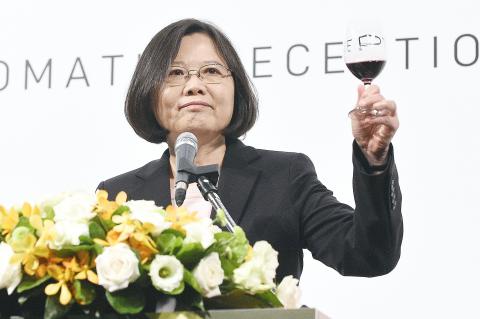Democratic Progressive Party (DPP) presidential candidate Tsai Ing-wen (蔡英文) yesterday announced a “new southward policy” to strengthen relations with Southeast Asian countries and India.
Tsai said ASEAN and India are soon to become major economies in the world and that “it is a natural choice for us to step up overall relations with ASEAN and India” as Taiwan seeks to diversify its trade.
“In the future, we will establish a task force to actively execute the goals of the policy,” Tsai said at a cocktail party for foreign envoys in Taiwan celebrating the 29th anniversary of the founding of the DPP.

Photo: Chen Chih-chu, Taipei Times
The nation’s “go south policy” in the past was designed to encourage Taiwanese enterprises to increase investment in Southeast Asian countries, Tsai said, adding that trade and investment will only be a part of the cooperation under her southward policy.
A diversified and multifaceted partnership is also to be established for civilian exchanges, as well as cultural and educational links, she said.
On the DPP’s foreign policy, Tsai said that “among us [the attendees at the party], there might be some countries whose national interests are not quite the same, and whose views on some issues might be different, but I believe all nations are striving for the same goals of peace, stability and prosperity.”
“We believe that there is a need to establish a domestic legal mechanism” to let Taiwan take part in the international community’s assistance for refugees, she said, adding that the DPP will also make efforts to ease regional conflicts, citing the tension in the South China Sea as an example.
More than 140 diplomatic personnel from 64 countries attended the party, including American Institute in Taiwan Director Kin Moy, Japan’s Interchange Association Representative Mikio Numata and Singapore Trade Office in Taipei Representative Wong Wie Kuen (黃偉權).
In response to Tsai’s policy announcement, Chinese Nationalist Party (KMT) presidential candidate Hung Hsiu-chu (洪秀柱) said that her staff are also drafting a foreign policy platform and that she is “of course” in favor of a policy that “does not put all of our eggs in one basket,” nor will she ignore nascent economic opportunities in ASEAN member states.
However, she added that she opposes any “single-minded” move to the south that “abandons the giant Chinese market to the west.”
Additional reporting by Chen Yu-hsuan

Chinese spouse and influencer Guan Guan’s (關關) residency permit has been revoked for repeatedly posting pro-China videos that threaten national security, the National Immigration Agency confirmed today. Guan Guan has said many controversial statements in her videos posted to Douyin (抖音), including “the red flag will soon be painted all over Taiwan” and “Taiwan is an inseparable part of China,” and expressing hope for expedited reunification. The agency last year received multiple reports alleging that Guan Guan had advocated for armed reunification. After verifying the reports, the agency last month issued a notice requiring her to appear and explain her actions. Guan

The Kaohsiung Tourism Bureau audited six hotels in an effort to prevent price gouging ahead of Korean band BTS’ concert tour in the city scheduled for Nov. 19, 21 and 22 this year. The bureau on Friday said that the audits — conducted in response to allegations of unfair pricing posted on social media — found no wrongdoing. These establishments included the local branches of Chateau de Chine, Hotel Nikko, My Humble House, and Grand Hai Lai, it said, adding that the Consumer Protection Commission would have penalized price gougers had the accusations been substantiated. The bureau said the Tourism Development Act

BACK TO WINTER: A strong continental cold air mass would move south on Tuesday next week, bringing colder temperatures to northern and central Taiwan A tropical depression east of the Philippines could soon be upgraded to be the first tropical storm of this year, the Central Weather Administration (CWA) said yesterday, adding that the next cold air mass is forecast to arrive on Monday next week. CWA forecaster Cheng Jie-ren (鄭傑仁) said the first tropical depression of this year is over waters east of the Philippines, about 1,867km southeast of Oluanpi (鵝鑾鼻), and could strengthen into Tropical Storm Nokaen by early today. The system is moving slowly from northwest to north, and is expected to remain east of the Philippines with little chance of affecting Taiwan,

GIVE AND TAKE: Blood demand continues to rise each year, while fewer young donors are available due to the nation’s falling birthrate, a doctor said Blood donors can redeem points earned from donations to obtain limited edition Formosan black bear travel mugs, the Kaohsiung Blood Center said yesterday, as it announced a goal of stocking 20,000 units of blood prior to the Lunar New Year. The last month of the lunar year is National Blood Donation Month, when local centers seek to stockpile blood for use during the Lunar New Year holiday. The blood demand in southern Taiwan — including Tainan and Kaohsiung, as well as Chiayi, Pingtung, Penghu and Taitung counties — is about 2,000 units per day, the center said. The donation campaign aims to boost